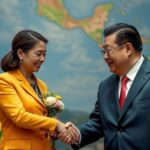Clash at AI Summit: China’s Fu Ying Challenges Professor Bengio on AI Safety
At a global AI summit in Paris, former Chinese ambassador Fu Ying confronted Professor Yoshua Bengio over AI safety regulations. She remarked on a lengthy safety report he co-authored and highlighted China’s emphasis on collaboration in AI development. The summit attracts major tech leaders and underscores the urgency of international dialogue on AI’s societal impacts amidst geopolitical tensions.
In a recent panel discussion at a global AI summit in Paris, Fu Ying, former Chinese ambassador to the UK, engaged in a pointed exchange with Professor Yoshua Bengio, known as the ‘AI Godfather.’ Fu humorously criticized a lengthy AI safety report co-authored by Bengio, acknowledging its complexity while noting that the Chinese translation spanned 400 pages, which she had yet to complete. She remarked on the nomenclature of AI safety institutions, indicating that China’s organization focuses on collaboration, as exemplified in its choice to name it the AI Development and Safety Network.
The summit attracted attendees from around 80 countries, including prominent tech executives such as Sam Altman from OpenAI, Brad Smith from Microsoft, and Sundar Pichai from Google. While Elon Musk’s attendance remains uncertain, discussions predominantly focus on regulating AI amidst increasing geopolitical tensions, particularly between the US and China. Fu expressed concern about how these hostile relations detract from collective efforts to enhance AI safety, stating, “At a time when the science is going in an upward trajectory, the relationship is falling in the wrong direction and it is affecting unity and collaboration to manage risks.”
Fu Ying underscored the rapid innovation in China since its 2017 AI development plan, contrasting China’s speed with that of Western nations. She warned of potential dangers emerging from this fast-paced growth while advocating for open-source AI development, which allows transparency and collective problem-solving. She argued that proprietary technologies utilized by leading US firms breed anxiety due to their opacity.
Conversely, Professor Bengio raised concerns about the potential misuse of open-source technologies. However, he acknowledged that the open-source approach used in China’s DeepSeek AI assistant may make identifying issues easier compared to the more closed systems employed by US tech giants.
World leaders, including President Emmanuel Macron of France and Prime Minister Narendra Modi of India, are set to engage in discussions concerning the broader impacts of AI, its relevance to public interest, and the associated risks. A new $400 million initiative was introduced to bolster public-serving AI projects, especially in healthcare. UK officials echoed the urgency of adopting AI technology to sustain critical sectors like the National Health Service (NHS), emphasizing the need for efficiency advancements through AI integration.
Experts predict that AI may fundamentally alter labor markets, with Marc Warner from AI firm Faculty suggesting it could automate cognitive tasks similar to past technological revolutions in physical labor. This perspective adds to the ongoing dialogue regarding the balance between leveraging AI for productivity and mitigating its societal risks.
The AI landscape is undergoing significant transformation, driven by rapid technological advancements and increasing global competition, especially between the US and China. The recent summit in Paris aimed to bring together leaders across various sectors to explore these dynamics and address regulatory frameworks for AI. The discussions highlight both the opportunities and challenges of implementing AI technology responsibly, particularly in light of differing national agendas and standards for safety and transparency.
The panel discussion at the Paris AI summit epitomizes the tensions and complexities inherent in international AI governance. As leaders and experts navigate the intricate balance between innovation and safety, the emphasis remains on fostering collaborative, transparent approaches that can mitigate risks. Conversations surrounding the rapid evolution of AI further underscore the urgent need for cohesive regulatory measures to harness its potential without compromising public welfare.
Original Source: www.bbc.com








Post Comment